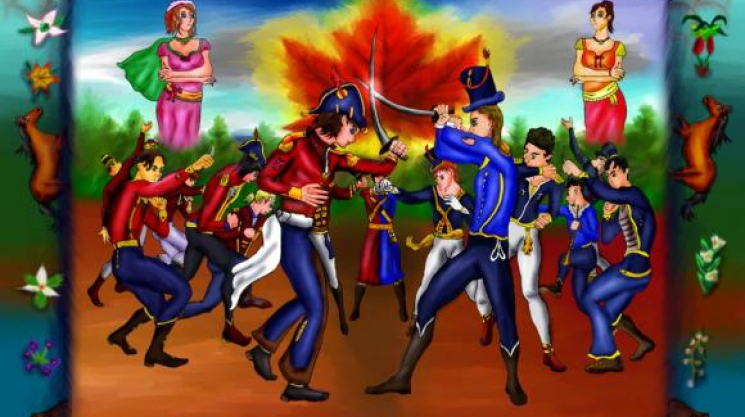
Mon, 07/09/2012 - 09:51 by Douglas Haddow
The summer is long around here, but at least it starts with a bang on July 1, when Ottawa embraces its role as the theoretical centre of all that is Canadiana, when the politicians trot up to the Hill again in the heat, sing the national anthem and watch a few bands most of us have never heard of play for the throng of red and white clapping hands and smiling, sweat-soaked faces. It usually rains sometime during the afternoon, just long enough to push the midday shift of drinkers from the patios and make room for the evening teams.
Over beers, we wonder about ourselves. Here is Canada, another year older, but where are we? What happened this last year, this last decade, this last century? What is it that matters to us? As it happens, this year there was one more thing to think about: the War of 1812™, the newest commemorative date we’ve had stamped in our collective brains for the past number of months leading up to this summer, which marked that magical point 200 years after it all kicked off – that strange battle with the Americans.
Flipping channels. There’s a TV commercial from the Canadian Mint. The Shannon, that proud naval vessel, embossed on the Toonie, full mast and flags aflutter, fresh from its triumph over the American ship, the Chesapeake. It was a victory that was good enough, apparently, to have us all carry it around in our pockets – to perhaps even ask our banks for a fresh one, straight from the conveyor belt – as a token that will live on in the cash registers of the nation for decades, muddied, faded, but not forgotten. A bit of glory in the change purse. Not mentioned, of course, is the actual nature of the fight – a callous challenge by a bored British commander, convinced he could outgun a Yankee vessel. He did, of course, but to no real strategic end – it was just a fight for the fighting’s sake. One for the home team, yes, but for what? Canada was not won or lost that day. But that doesn’t sound as good, and hell, the team at the Mint probably needed something.
Another ad pops up on a screen, this time in a darkened, air conditioned movie theatre – the final respite during the long hot evenings in the capital. “Two hundred years ago, the United States invaded our territory,” the gravely voice intones. The images we see are bleak. Laura Secord makes a run for it. American troops amass. “But we defended our land,” the voice says as Isaac Brock looks to the camera, and it seems like he might be the star of this thing. Supporting cast members are introduced: Tecumseh – with a vaguely aboriginal musical note to remind us all who the hell he was – and Charles de Salaberry, saying something French. And Laura Secord, still running. The gang’s all there. And wait – is that the Chesapeake in the background? Whatever, I guess. The Americans are in for it, shit is about to get real, and so forth. Then, a spoiler: We won. Canada, fuck yeah. Now, cue the credits and call it a day. This historical mashup was brought to you by the Government of Canada. You can learn more on your iPhone app, kids. Please sit back and enjoy Spiderman.
“It was during the War of 1812 – the battle for Canada – that the very foundations of this great country of ours were laid. A country born in French, a country proud of its cultural diversity, stability and prosperity, a country, Canada, that stands apart in North America,” the prime minister told the crowd standing in the sun on Parliament Hill back on July 1. “In fighting together, our ancestors in 1812 laid the basis for a common sense of Canadian nationality based on diversity. And they laid the basis for the vision of freedom, democracy and justice that is our inheritance, Canada, the best country in the world.”
This, it seems, is the new nationalism – another layer in the cake, sandwiched between hockey and Timbits and Olympic medals: the myopic casting of a time that maybe was, the easy-bake solution to a complicated past.
“When the past is conserved or re-enacted for our entertainment, it is usually (though not invariably) presented it its most attractive light,” John Tosh wrote not so long ago. And he seems to be right about that one. There they are, those almost-Canadians, gussied up for the big screen, in brilliant high definition and with a cool soundtrack and a simplistic plot, all righteousness and hubris without any of that annoying nuance or subtlety. There are no grey areas to fog this story. It is the crudest of nationalism, resting on what Tosh called “the assertion of tradition, rather than an interpretation of history” – that which “suppresses differences and change in order to uphold identity.”
Still, we seem OK with it, all this endless commemoration. Perhaps it’s because by now, it has become familiar. After all, it’s what we did to the twentieth century – a decade pockmarked with countless commemorative dates, a time that is only just barely behind us but whose “quarrels and dogmas, ideals and fears” are already “slipping into the obscurity of mis-memory,” as Tony Judt diagnosed it not long before his death. Points throughout the years have of course been duly highlighted, Judt said, but they are “either avowedly nostalgic – triumphalist... or else, and increasingly, opportunities for the acknowledgement and recollection of selective suffering.” And despite all the effort, in the end, we may be no further along in understanding ourselves. “Such official commemoration, however benign its motives, does not enhance our appreciation and awareness of the past,” Judt wrote. “It serves as a substitute, a surrogate.”
War of 1812, we hardly knew ye. But that doesn’t matter now.
(image via)





Add comment